Key takeaways:
- Organic wine production emphasizes eco-friendly practices, avoiding synthetic pesticides and fertilizers, and enhancing soil health and biodiversity.
- Choosing organic wine supports sustainable farming, leading to a healthier ecosystem and a purer drinking experience with lower sulfites and no synthetic additives.
- Practicing moderation in wine consumption, such as setting limits and sharing, enhances the wine experience and fosters deeper social connections.
- Mindful drinking through intentionality, savoring each sip, and maintaining a tasting journal deepens appreciation and enriches social interactions.
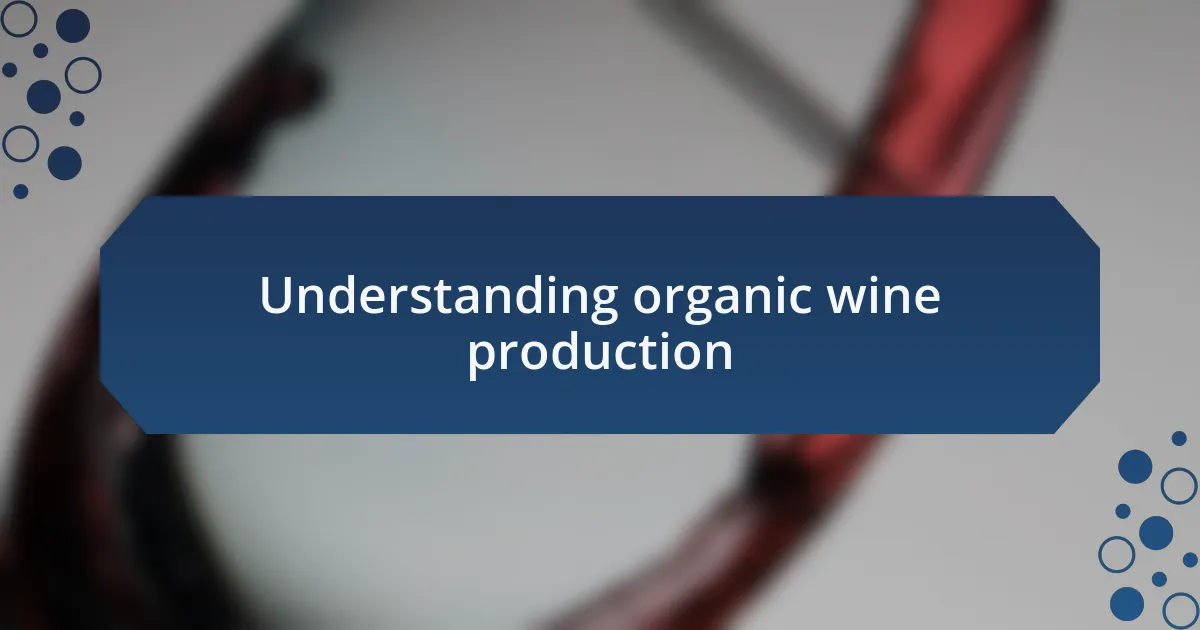
Understanding organic wine production
Organic wine production centers on cultivating grapes without the use of synthetic pesticides or fertilizers. This commitment not only promotes soil health but also ensures that the wines produced are free from harmful chemicals. I remember my first taste of organic wine; the freshness was unmistakable. It left me curious: how can something grown so naturally taste so vibrant?
The process begins in the vineyard, where organic farmers emphasize planning and biodiversity. They might employ companion planting, which not only supports pest control but also enhances the ecosystem. I often wonder how different the wine landscape would be if more vineyards adopted these practices. It’s fascinating how a vine can thrive with the right companions, much like how we flourish within supportive communities.
Harvesting organic grapes requires a deeper understanding of nature’s rhythms, which fosters a unique connection between the winemaker and the land. Each bottle tells a story of the specific environment and techniques used, making it a true reflection of its origin. I can almost feel the passion in each sip as I think about the effort put into crafting these wines. Isn’t it inspiring to consider how much care goes into each bottle of organic wine?
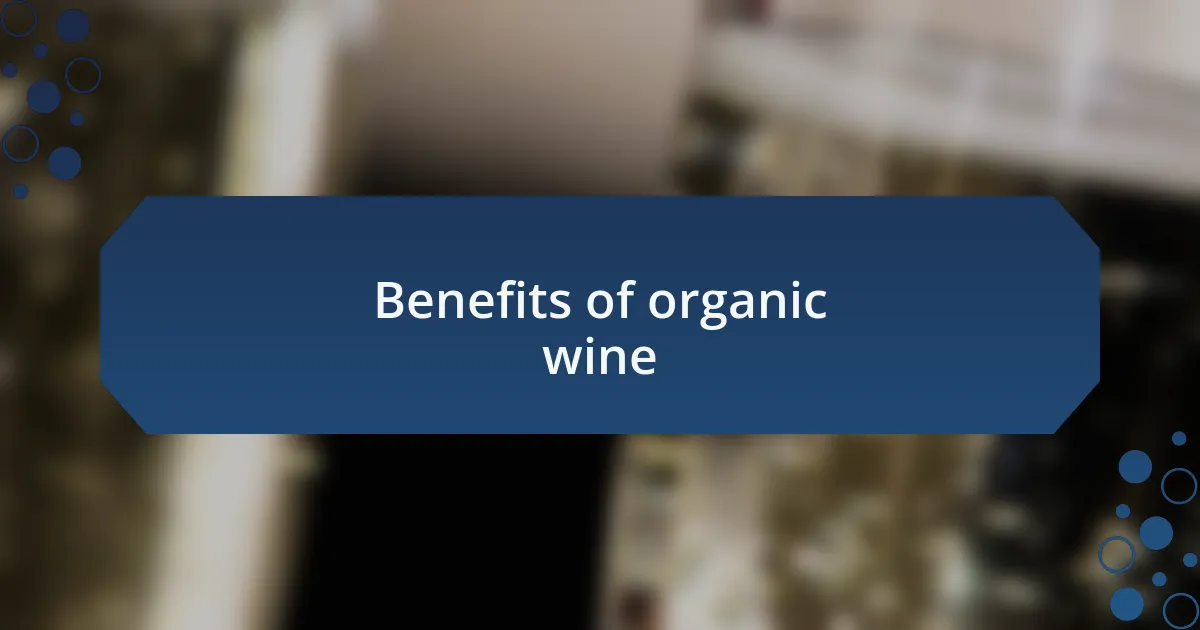
Benefits of organic wine
One of the most striking benefits of organic wine is its purity. When I savor a glass of organic wine, I’m often amazed by the clarity of flavor that comes from grapes grown without artificial inputs. It feels like I’m tasting the vineyard’s true essence, with each sip revealing the character of the land and the vintage more vividly than any conventional wine I’ve experienced. Isn’t it interesting how much we might overlook in wines treated with chemicals?
The health aspect of organic wine is equally important. Many people, including myself, appreciate knowing that these wines are generally lower in sulfites and free from synthetic additives. I recall a gathering where I opted for an organic bottle; everyone was surprised at how much lighter and more invigorating it felt compared to the usual choices. It sparked a conversation about how natural production could make us feel better about what we consume.
Moreover, supporting organic vineyards means advocating for sustainable farming practices that benefit both the environment and the community. The more I delve into this topic, the clearer it becomes that choosing organic wine isn’t just a personal preference; it’s a small but significant step toward preserving our planet. Isn’t it empowering to think that with each bottle we choose, we contribute to a healthier ecosystem?
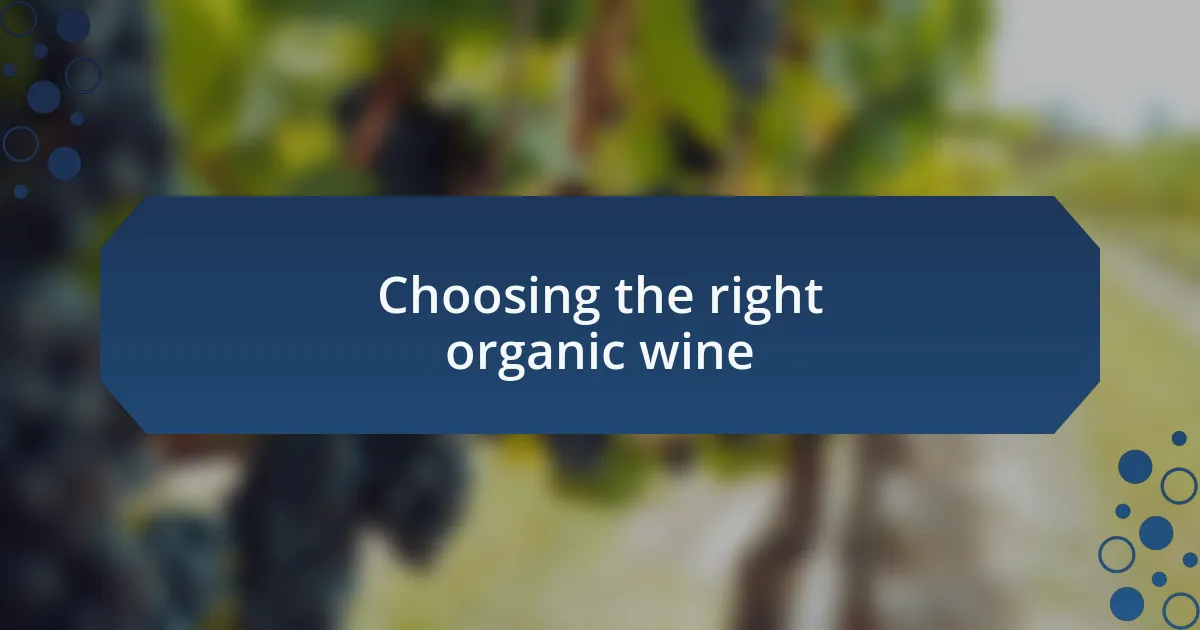
Choosing the right organic wine
When it comes to choosing the right organic wine, I find that personal preference plays a huge role. For instance, I usually lean towards red wines that showcase fruity notes and a hint of earthiness, as they pair wonderfully with my favorite dishes. Have you ever looked at a wine label and felt an instant connection to a bottle? Sometimes, it’s about the story behind the wine just as much as its taste.
I also pay close attention to the region where the wine is produced. I remember trying a Cabernet Sauvignon from a small organic vineyard in California. The unique terroir—a term referring to the environmental factors that affect a crop’s phenotype—made each sip an adventure. Isn’t it fascinating how a region can shape the flavor profile of the wine? Knowing the origin gives me a deeper appreciation for not only the wine itself but also the hard work that goes into organic cultivation.
Lastly, I always consider the winemaker’s philosophy. A few months ago, I listened to an organic winemaker discuss their commitment to sustainable practices and the health of their vines. It struck me how their passion translated into the glass. How reassuring it is to enjoy a wine made with care and respect for nature! Understanding the values behind the bottle often enhances my drinking experience, making it all the more satisfying.
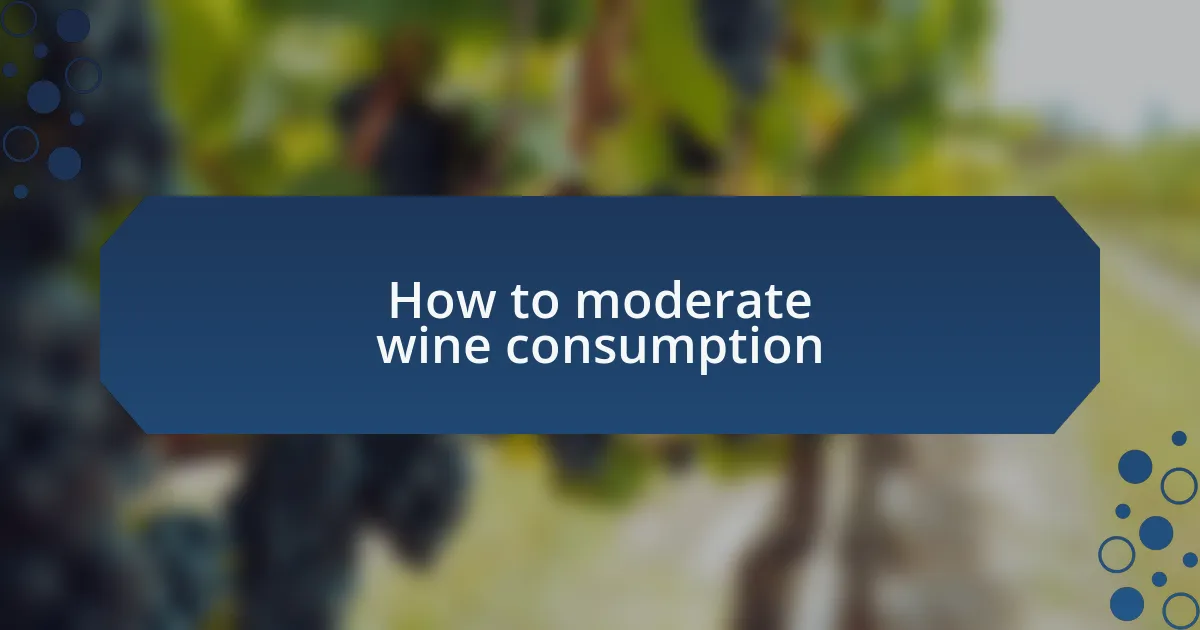
How to moderate wine consumption
Moderating wine consumption is an essential skill that can enhance the experience of enjoying organic wines. I’ve found that setting personal limits—like deciding to uncork a bottle only on weekends—creates anticipation and makes those moments more special. Have you ever noticed how savoring a glass feels even better when it’s a little more deliberate?
I also recommend keeping track of how much you’re drinking. I once started a wine journal to note my thoughts on each bottle I savored. It not only helped me engage more with the wine but also allowed me to see my consumption patterns. This simple act of recording those tasting notes turned into a fun project that transformed my relationship with wine.
And, don’t shy away from choosing smaller glasses or sharing a bottle with a friend. I discovered that sharing a bottle with a friend not only sparked delightful conversations but also stretched out the enjoyment. Isn’t it intriguing how social interactions can enhance our appreciation for what we drink? By moderating the amount, I genuinely found that every sip became richer and more meaningful.
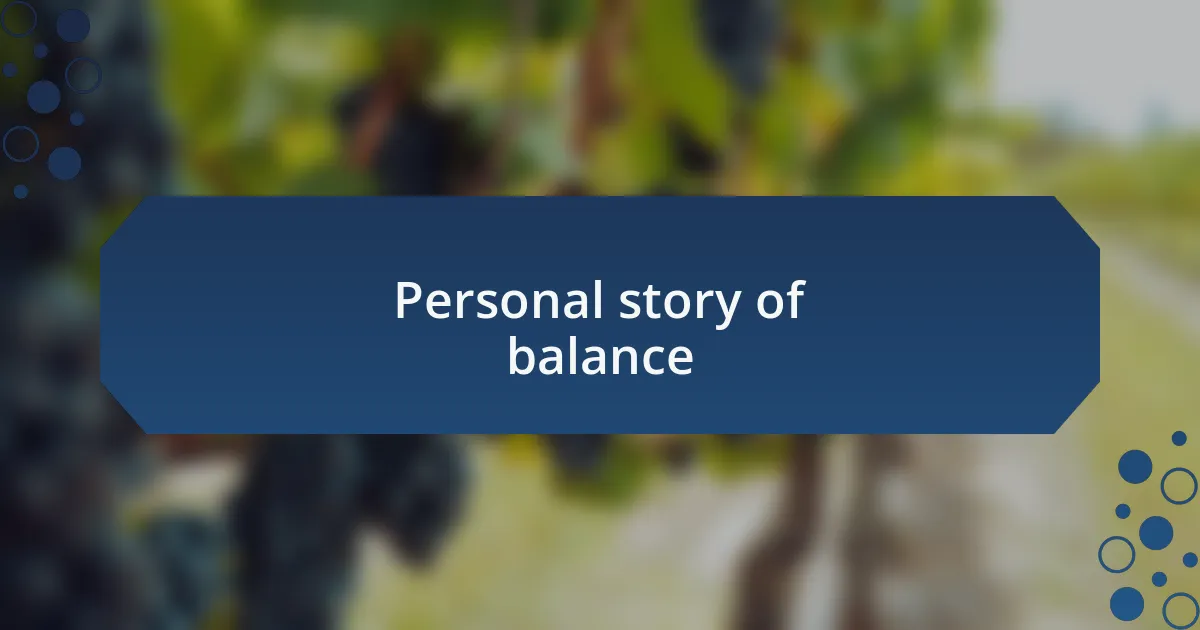
Personal story of balance
Finding balance in my wine drinking journey has been eye-opening. I remember a time when I would pour a glass without much thought, simply going through the motions. Now, I cherish each moment, often reflecting on the vineyard practices that nourish the grapes. How wonderful it feels to connect those sips with the stories behind the wine!
There was a pivotal weekend retreat where I decided to embrace mindfulness while enjoying wine. Instead of indulging freely, I took the time to appreciate not just the flavors but also the company around me. I can still recall the warmth of laughter mingling with the aromas of a beautifully aged Merlot. Have you ever felt how moments like that can be abundant without excessive consumption?
Making this shift allowed me to explore new wines without the pressure to overindulge. I discovered that some of my most cherished memories are tied to spontaneous tastings with friends, where the discussion flowed just as easily as the wine. I’ve learned that true enjoyment often resides in moderation, and I find joy in celebrating those delicate balances.
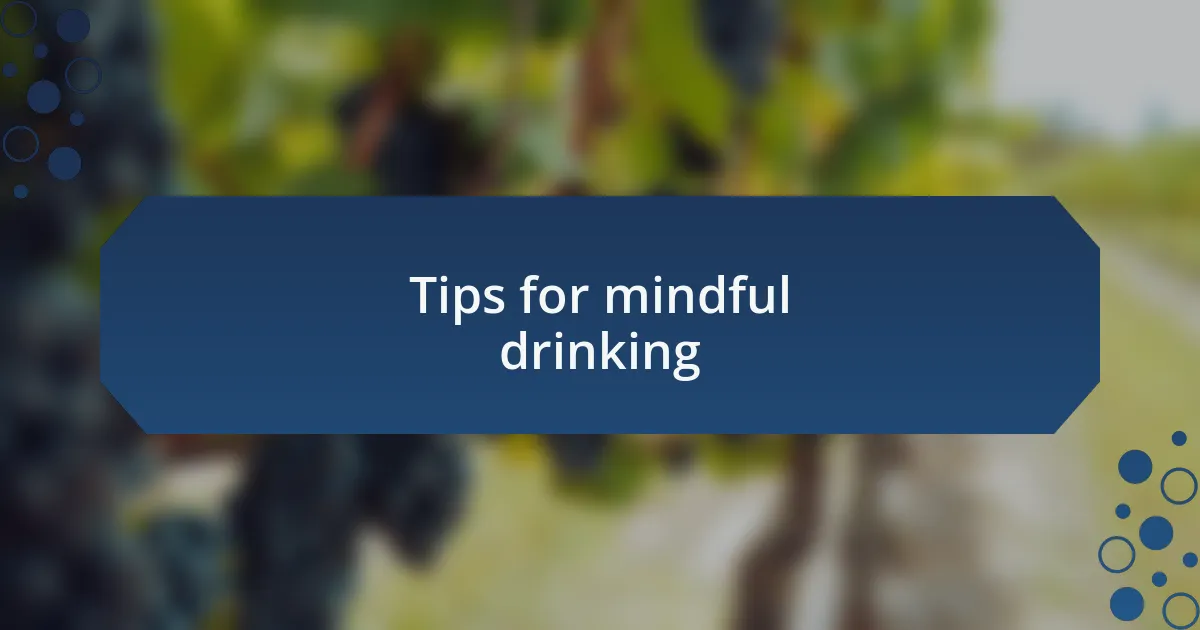
Tips for mindful drinking
When I think about mindful drinking, one practice that really transformed my relationship with wine is setting an intention before I pour. I’ve found that simply asking myself what I hope to gain from that glass—whether it’s relaxation, enjoyment, or even celebration—changes the way I experience each sip. Have you ever paused to consider your motivations? This small shift can make all the difference.
Another tip I cherish is to slow down while drinking. I remember a lovely summer evening spent on my patio with a vibrant rosé. Instead of guzzling it down, I took my time, savoring each sip and allowing the flavors to unfold. I tuned into the sounds of nature, letting them enhance my experience. Doesn’t it feel fantastic to fully engage with your surroundings rather than rush through?
Lastly, I’ve started keeping a tasting journal. Writing down my thoughts about each wine helps deepen my appreciation and keeps me mindful. I often reflect on what made me enjoy a particular bottle, whether it’s the vineyard’s organic practices or the unique notes that danced on my palate. Sharing these reflections with friends has made our gatherings more meaningful; have you ever noticed how discussing flavors can ignite conversations? This practice has not only enhanced my enjoyment but also fostered connections that go beyond the glass.
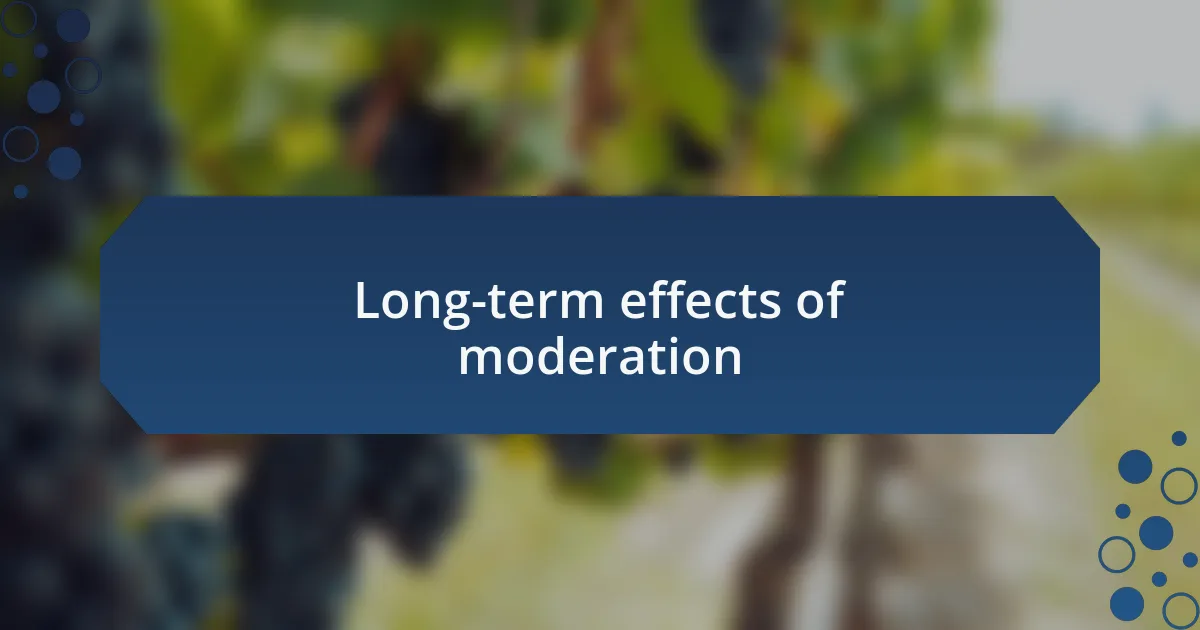
Long-term effects of moderation
Long-term moderation in drinking has allowed me to notice subtle shifts in my overall well-being. I vividly recall a moment when a close friend shared how our bi-weekly gatherings felt more vibrant and engaging now that we often share a single bottle over dinner. Can you imagine experiencing deeper connections with loved ones, rather than just focusing on the drink itself?
As I continued this path of moderation, I began to embrace newfound clarity in my day-to-day life. I noticed that my mornings became more energized instead of groggy, making it easier to tackle the day ahead. It’s remarkable how reducing my intake even slightly has improved my mental health; I often wonder if others have felt this change as well when they choose moderation.
With time, I’ve also discovered improved sleep patterns, which was a revelation for me. There was a phase when I thought a glass of wine would lull me into slumber, but the truth is, moderation promotes deeper, more restorative rest. When did I realize that quality of sleep matters more than simply drifting off? The long-term benefits of moderation extend far beyond what we drink, reflecting a holistic approach to life that I truly cherish.